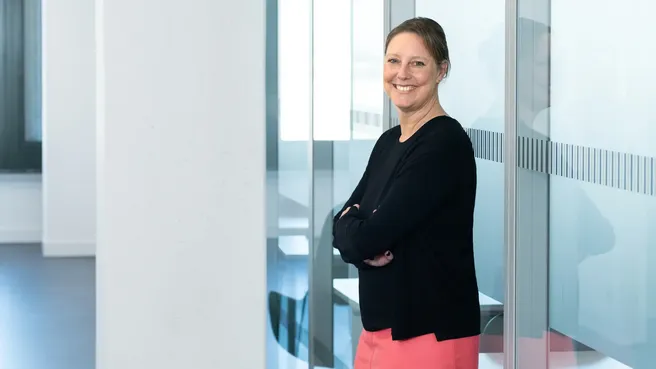Battery performance is still regarded as the Achilles heel holding electromobility back from a decisive breakthrough. For many years the solid state battery has been seen as the potential game changer in that regard. Unlike conventional lithium ion batteries, these batteries use solid rather than liquid electrolytes. This promises greater energy density and, as a result, longer ranges and shorter charging times. But so far the technology has failed to make gains in the mass market.
The start-up Qkera wants to change that. The research team working at the e-conversion Cluster of Excellence has developed electrolyte components that will make it possible to produce batteries with energy densities that the team estimates to be 30 to 50 percent higher than that of conventional batteries. The components are also remarkably thin and stable. Equally important: The team has developed a manufacturing process that will facilitate low-cost production. The technology could be used not only in cars, but also in smartphones and laptops.
Qkera’s electrolytes consist of a lithium ion-conducting ceramic-oxide material. “In reality, it is practically the same material that a coffee cup is made of,” explains Jennifer Rupp, Professor of Solid State Electrolytes at the Technical University of Munich (TUM) and a co-founder of Qkera. This has benefits for safety and sustainability. Ceramics are practically non-inflammable and the batteries can be made without the rare earths that are often mined in crisis regions. “For example, our technology makes it possible to make high-performance batteries with lithium iron phosphate cathodes that actually show lower output than cobalt-based alternatives – and the material can be mined in Europe,” explains Dr. Andreas Weis, co-founder and CTO of Qkera.
Supported in a TUM Venture Lab
Jennifer Rupp has been working on this research topic over her entire career. “But at some point I realized that I would have to start my own company. Otherwise I would lose control of the technology.” In November 2023 Qkera was founded. “I conducted research in the USA for a long time and could have started a company there. But I wanted to do it in Germany,” says Jennifer Rupp. “We wanted to make our own contribution to help ensure that we in Europe would not be dependent on other countries with regard to energy storage.”
Qkera is receiving support in the TUM Venture Lab ChemSPACE. Each of the TUM Venture Labs specializes in an important technological field. They offer the start-up teams technical infrastructure geared to their specific needs, tailor-made training programs, expertise for the respective market and global networking with the industry. Qkera also received support with financing under the program Funding for Innovators, offered by UnternehmerTUM, the Center for Innovation and Business Creation at TUM.
“In the first year since founding the company we have made a huge number of technological advances,” says Andreas Weis. Production now takes place at less than half of the usual synthesis temperature and has been optimized at a high speed, which saves greenhouse gases and in turn reduces the impact on the climate. By the end of this year the company plans to send the prototype to battery manufacturers so that they can utilize Qkera components for various battery designs.
Winner at Falling Walls
The Falling Walls jury sees the team’s work as one of the most important scientific breakthroughs of the year. To mark the anniversary of the fall of the Berlin Wall on November 9, the Falling Walls Foundation hosts its annual Science Summit in Berlin around that date to promote public awareness of the walls being demolished in the world of science. It is regarded as one of the most important events for fostering discussions between the world of research and society at large and within the scientific community. Falling Walls selects the most important achievements in five research fields and in the Science Start-ups category. Qkera is one of just 25 companies selected from more than 1100 startups from around the world.
Further information and links
- Falling Walls Venture Winners 2024
- Panel discussion „AI Governance: How to Benefit Everyone?“ with Prof. Urs Gasser und Prof. Helmut Krcmar at the Falling Walls Science Summit on November 9 (livestream)
- Every year, more than 70 technology-oriented companies are founded at TUM. TUM and UnternehmerTUM, the Center for Innovation and Business Creation, support start-ups with programs that are precisely tailored to the individual phases of founding - from the conception of a business model to management training, from market entry to a possible IPO. The TUM Venture Labs offer start-up teams from major technology fields an entire ecosystem in direct connection with research. Up to 30 teams can use the TUM Incubator to prepare for the launch of their company. UnternehmerTUM invests in promising technology companies with its own venture capital fund and offers the MakerSpace, a 1,500 square meter high-tech workshop for prototyping.
Technical University of Munich
Corporate Communications Center
Original article: https://www.tum.de/en/news-and-events/all-news/press-releases/details/new-technology-for-solid-state-batteries
